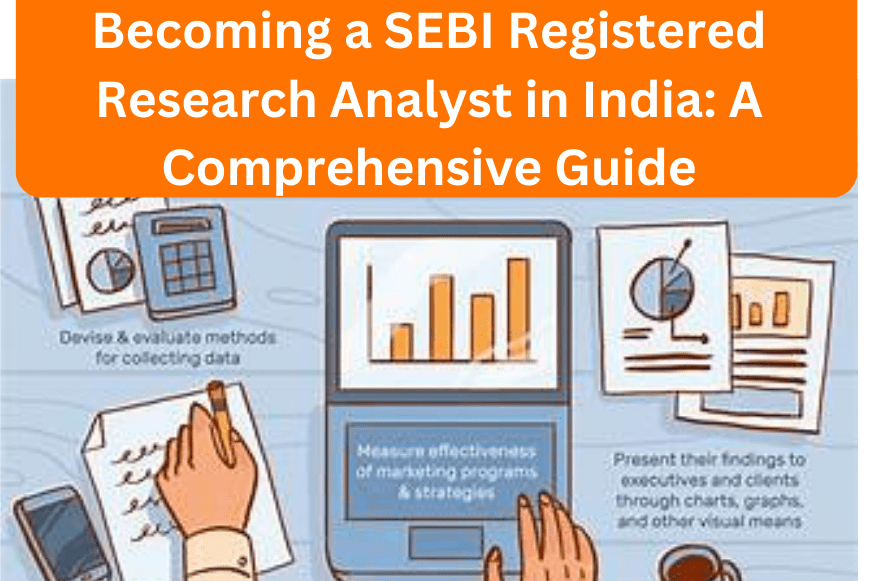The article “Becoming a SEBI Registered Research Analyst in India: A Comprehensive Guide” is written by Adv. Siddhant Jain
The Securities and Exchange Board of India (SEBI) plays a vital role in overseeing the securities market. Among the key positions in this sector is the Research Analyst. A SEBI Registered Research Analyst offers advice and recommendations on securities, which can significantly impact market trends and investor decisions. To ensure that only qualified professionals undertake this role, SEBI has established a rigorous process and stringent eligibility criteria through the SEBI (Research Analyst) Regulations, 2014.
Eligibility Criteria
Qualifications:
To become a SEBI Registered Research Analyst, you must have a professional degree or postgraduate diploma in finance, accountancy, business management, commerce, economics, capital markets, or financial services from a recognized institution. This qualification ensures a strong foundation in finance. Alternatively, a graduate in any discipline with at least five years of relevant experience in financial products, markets, securities, fund, asset, or portfolio management is also eligible.
Certification:
A valid certification from the National Institute of Securities Markets (NISM) or any SEBI-recognized certification is mandatory. Periodic renewal of this certification is required to maintain its validity, highlighting SEBI’s focus on continuous learning and adherence to updated market regulations.
Experience:
While a postgraduate degree doesn’t require prior experience, it is highly preferred. Graduates, however, must have at least five years of experience in areas related to financial products, markets, securities, fund, asset, or portfolio management.
Capital Adequacy:
Individuals and partnership firms must have a net worth of at least INR 1 lakh. For body corporates and LLPs, this requirement increases to INR 25 lakhs, ensuring sufficient financial backing to operate in the market.
Infrastructure:
Adequate infrastructure is essential for conducting research analysis activities effectively. This includes office space, necessary equipment, research software, and other communication facilities.
Application Process
Form A Submission:
The application process begins with submitting Form A, as specified in the SEBI (Research Analyst) Regulations, 2014. You must submit this form, along with a non-refundable application fee, through the SEBI Intermediary Portal.
Scrutiny and Queries:
SEBI carefully reviews the application and may request additional information or clarification. In some instances, you may need to appear before SEBI for a personal presentation.
Approval and Fees:
After verifying the documents, SEBI grants approval and requests the registration fee. The fee is INR 10,000 for individuals or partnership firms and INR 5,00,000 for body corporates or LLPs.
Issuance of Certificate:
Once the registration fee is paid, SEBI issues the certificate of registration, which remains valid unless suspended or canceled.
Post-Registration Compliances
SCORES Portal Registration:
You must register on the SEBI SCORES portal within one month of receiving your SEBI registration number. This platform helps facilitate the resolution of investor grievances, ensuring accountability.
Display Requirements:
You must display your registration details, including the name, logo, registration number, full address, contact information, and the compliance officer’s name and contact number, on all official portals and publications.
Compliance Audit:
You must undergo an annual compliance audit by a member of the Institute of Chartered Accountants of India or the Institute of Company Secretaries of India. This audit ensures adherence to all SEBI regulations.
Record Maintenance:
You must maintain records of research reports, recommendations, rationale for recommendations, and public appearances for a minimum of five years.
Conclusion
The SEBI (Research Analyst) Regulations, 2014, provide a solid framework for maintaining the integrity of the securities market. They ensure that only qualified and credible individuals or entities can offer research and advice. SEBI’s strict eligibility criteria and ongoing compliance requirements demonstrate its commitment to protecting investors and maintaining market stability.
However, the regulations may appear restrictive, particularly for smaller firms or individual analysts who may struggle with the capital adequacy and infrastructure requirements. SEBI might consider a tiered system allowing smaller entities with strong qualifications and experience to participate in the market, albeit with specific limitations.
Moreover, the requirement for a postgraduate degree or a minimum of five years of experience might deter younger, yet skilled, professionals from entering the field. SEBI could explore alternative pathways for such candidates, such as rigorous testing or additional certifications, ensuring that the market benefits from fresh talent without compromising quality.
In conclusion, while the SEBI (Research Analyst) Regulations, 2014, are designed to safeguard investor interests and ensure market participant credibility, there is potential for refining these regulations. This would balance stringent regulation with broader participation in the research analysis field, enhancing market diversity and fostering innovation in the financial sector.
Also Read About- Becoming a SEBI Registered Investment Advisor in India: A Comprehensive Guide
If you have any legal queries or require legal assistance, you can book a consultation with me: “Click Here”

Meet Siddhant Jain — a lawyer who thrives in the dynamic world of Business & Commercial Law, Private Client Practice, and Maritime Matters. For him, boardrooms are battlefields, mergers are puzzles, and corporate jargon is a second language. Whether it’s navigating the maze of company law, tackling securities regulations, steering businesses through the stormy seas of bankruptcy and insolvency, or handling complex maritime disputes, Siddhant has done it all.
Beyond the corporate hustle, Siddhant also works closely with private clients — advising on wills, Trust, family settlements, agreements, and bespoke legal strategies to safeguard both business and personal interests.
From drafting intricate legal opinions on mergers to guiding company closures, and from advising shipping stakeholders to assisting families in succession planning, his practice spans a diverse legal spectrum. And when he’s not solving legal riddles, Siddhant shares his insights through newsletters and publications — because why should only his clients benefit from all that knowledge?
If you’re looking for someone who can untangle the knots of business law, safeguard your personal matters, or help you sail through maritime complexities (with a touch of humor along the way), Siddhant’s your guy.
📩 Reach him at siddhantjain2403@gmail.com

Very well written and nicely understood